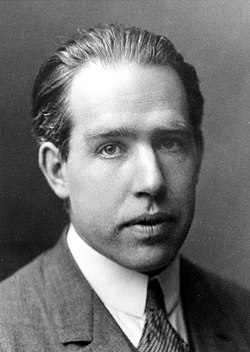Difference between revisions of "Release 2.4.0 Bohr"
From AtlasWiki
m |
|||
| Line 33: | Line 33: | ||
| − | [https://en.wikipedia.org/wiki/Niels_Bohr Niels Henrik David Bohr] was a Danish physicist who made foundational contributions to understanding atomic structure and quantum theory, for which he received the Nobel Prize in Physics in 1922 | + | [https://en.wikipedia.org/wiki/Niels_Bohr Niels Henrik David Bohr] was a Danish physicist who made foundational contributions to understanding atomic structure and quantum theory, for which he received the Nobel Prize in Physics in 1922. |
Bohr developed the [https://en.wikipedia.org/wiki/Bohr_model Bohr model] of the atom, in which he proposed that energy levels of electrons are discrete and that the electrons revolve in stable orbits around the atomic nucleus but can jump from one energy level (or orbit) to another. Although the Bohr model has been supplanted by other models, its underlying principles remain valid. He conceived the principle of complementarity: that items could be separately analysed in terms of contradictory properties, like behaving as a wave or a stream of particles. | Bohr developed the [https://en.wikipedia.org/wiki/Bohr_model Bohr model] of the atom, in which he proposed that energy levels of electrons are discrete and that the electrons revolve in stable orbits around the atomic nucleus but can jump from one energy level (or orbit) to another. Although the Bohr model has been supplanted by other models, its underlying principles remain valid. He conceived the principle of complementarity: that items could be separately analysed in terms of contradictory properties, like behaving as a wave or a stream of particles. | ||
Revision as of 23:39, 12 August 2015
2015-08-12
Release Notes
| Atlas Core | 2.4.0 |
| Atlas for Java | 2.4.0 |
| Atlas for C | 2.4.0 BETA |
| Atlas Scala Shell | 2.4.0 |
| Atlas for Java/Android Binaries | 2.4.0 BETA |
| Enhanced Jimple Support for Eclipse | 2.4.0 BETA |
Bohr
Niels Henrik David Bohr was a Danish physicist who made foundational contributions to understanding atomic structure and quantum theory, for which he received the Nobel Prize in Physics in 1922.
Bohr developed the Bohr model of the atom, in which he proposed that energy levels of electrons are discrete and that the electrons revolve in stable orbits around the atomic nucleus but can jump from one energy level (or orbit) to another. Although the Bohr model has been supplanted by other models, its underlying principles remain valid. He conceived the principle of complementarity: that items could be separately analysed in terms of contradictory properties, like behaving as a wave or a stream of particles.
